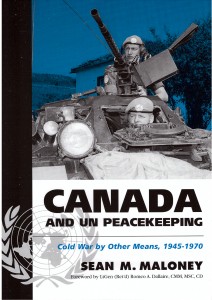
CUNPK made front-page news the day it was released in 2002. Using declassified sources never employed before, the book demonstrated that Canada’s UN peacekeeping efforts during the first half of the Cold War were in fact extentions of NATO strategy to contain Soviet communist influence in the decolonizing Third World and to prop up areas that were critical to NATO in the event of a Third World War. The United States used the CIA as the “bad cop” in the peripheral areas while Canada used the UN as the “good cop”. Indeed, CUNPK went so far as to demonstrate that former Canadian Prime Minister Lester B. Pearson did not invent UN peacekeeping, a myth maintained by Canada’s Department of Foreign Affairs and International Trade and practically every cultural institution in Canada, all of which pump up the UN and downplay NATO. Indeed, numerous ad hominem attacks were launched against me in the media and in book “reviews” by academics sympatheic with the DFAIT agenda. Fortunatley, General Romeo Dallaire, the Canadian force commander for the UN mission in Rwanda, wrote a foreword reflecting on the importance of the Cold War effort and its applicability today. I am was by people in DFAIT that they didn’t want to be caught reading the book at work, so they look at it under their desks….
Foreword Text:
It is a pleasure to contribute the forward to Sean Maloney’s Canada and UN Peacekeeping: Cold War by Other Means, 1945-1970. His energy, thorough research and fair approach to Canadian military history, traits for which he already has a formidable reputation, are well applied to this subject. And what of that subject? Clearly, for those of us who practice peacekeeping there is a dearth of scholarship, specifically with regards to its history, origins and early development. Is it not strange that Canada, the prime practitioner and arguably the inventor of UN peacekeeping, has until now, not produced a history detailing her involvement in this critical role? Think of the lessons we might have learned and applied!
I, for one, am extremely proud of our hard-won reputation and I want Canadians to display similar pride. This work will help us understand how it was done in the early days and explains in detail the difficult journey Canadian policymakers undertook in search for security in the nuclear age. It was not always heroic: it could be tedious, frustrating, and dangerous. Canadian politicians, soldiers and diplomats sometimes had to adopt questionable methods to get the job done during the dark days of the Cold War: the author does not shirk his duty in his examination of them. Yet UN peacekeeping was one means by which we protected ourselves, our allies, and even our enemies from annihilation. There should be no apologies for what we did or how we did it. Canadians made the world a better place.
We were and remain important players on the stage of global conflict. The threat in the 1950s and 1960s was perhaps different from that of the 1990s.
Yet we can no longer uncritically fall back on our reputation. We did that in the 1990s and had problems adapting to the new strategic environment. This was a new era, one which demanded that we jettison old methodologies in policy formulation, leadership, doctrine, training, officer development and civil-military relations. It was a period of trial and error, just as our predecessors in the 1950s and 1960s conceived and developed UN peacekeeping by trial and error. They had the formidable task of using peacekeeping to freeze brushfire conflicts before they could expand into nuclear war. We now have the task of making peacekeeping evolve to a higher state of conflict resolution and stabilize the world from anarchy, warlordism, and ethnic violence. In the past, peacekeeping was an adjunct to our containment efforts. Peacekeeping now must become part of a multi-disciplinary approach: diplomatic, humanitarian, and stabilization fields must work in harmony as they never have before. To do this, we must understand the 1950s and 1960s before we can understand the 1990s, and then we can move forward to this new state we seek. Sean Maloney’s book is the first step. Read and learn.
-Lt Gen (Ret’d) Romeo A. Dallaire, CMM, MSC, CD